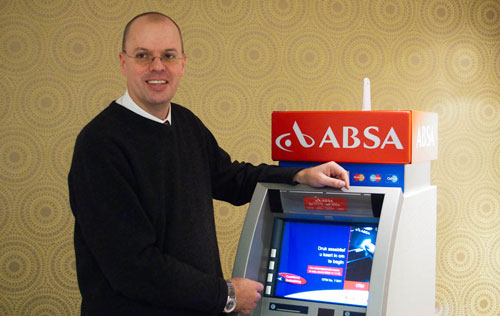
Banking group Absa said on Tuesday that CashSend, its cardless cash transfer offering, has exceeded R500m in transactions since its launch in late 2008.
CashSend allows Absa customers to send money to anyone with a mobile phone by means of Internet or cellphone banking or from any of Absa’s ATMs.
Adrian Vermooten, deputy managing executive of Absa digital channels, says customers can also send money to most countries via Internet and mobile channels because of a deal with Western Union.
The CashSend service works by sending the receiver a Pin number via SMS. The receiver enters this in conjunction with a secret code allocated by the sender into any Absa ATM to withdraw the transferred amount. The receiver need not have an Absa account, or in fact any bank account whatsoever.
Although CashSend was originally intended for entry-level individual customers Absa has now introduced CashSend Plus, aimed at businesses. Business owners can schedule multiple payments or remotely authorise payments.
All of Absa’s 11m clients are automatically able to use CashSend to send money from their accounts, and are able to send amounts between R20 and the daily maximum of R3 000.
Absa’s service isn’t phone dependent as it can be used via cellphone technologies USSD, WAP and WIG. Vermooten says that with 30m “call-backs” sent per day in SA and a large prepaid subscriber base used to using recharge vouchers, SA consumers are familiar with USSD so barriers to entry are low.
Absa has found the product appeals to large companies running cash giveaways to multiple consumers. “With CashSend it’s easy for competition winners to get their cash and it’s easy for the company giving it away to administer it. Moreover, it’s cost effective,” says Vermooten.
He says an interesting trend is the number of people sending money to themselves rather than other people. “We’re seeing 25% of customers send money to themselves. Many of our customers don’t always carry their ATM cards with them, but if they have their phone they can get cash.”
Vermooten says CashSend is not exclusively an urban-to-rural money transfer mechanism. In fact, there are “strong patterns showing the reverse”. He says CashSend has proved particularly popular at ATMs near university campuses. “Students are being supported by money coming from less urban areas into more urban ones.” — Craig Wilson, TechCentral
- Subscribe to our free daily newsletter
- Follow us on Twitter or on Facebook




